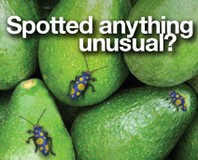Read the latest information on
Foot-and-mouth disease

You don’t need to know what every exotic pest looks like. Anything that looks a bit different from normal should be reported.
If you ever noticed signs of a new pest or disease on your plants would you know what to do about it? If the answer is no, please save the Exotic Plant Pest Hotline number 1800 084 881 on your phone now, so you have it at hand in case you ever need it.
The hotline is a free-call telephone service to report unusual plant pests and diseases, including any unusual bees. The number is staffed during business hours of normal work days in each state or territory, so that action can be taken by knowledgeable local staff. There’s usually also an out-of-hours answering service to leave a message so you can be contacted later.
Chris Anderson is a plant pest expert with the Queensland Department of Agriculture and Fisheries who has investigated some of the calls in his area.
“When a call is received on the hotline, a team of experts will assess the information provided, and if warranted, the information will be passed on to the Chief Plant Health Manager in the relevant state or territory. It’s the CPH Manager who decides on the appropriate action to be taken,” says Chris.
“Often, a response team is created consisting of experts in the relevant area to assess the risks. They look at the property, inspect plants showing symptoms, collect samples, which are then sent or taken to a laboratory for diagnosis.”
There are about 80 pests that are considered emergency plant pests in Australia, but over 300 are considered high priority plant pests. What’s more, there are about 3000 pests listed as potential threats.
With such a huge number of pests with the potential to impact on Australian growers, you could be excused for not knowing them all.
That’s where the slogan ‘spotted anything unusual’ comes in. If you are familiar with the common pests and diseases that can affect your crop, all you need to do is to be able to spot something a bit different from the usual suspects. That’s when you should contact the hotline to be sure.
“Each year there can be hundreds of reports made to the hotline in Queensland alone. Reports may come directly from producers or growers, but calls are also made by agronomists and entomologists who are consulted by the grower. Only a few calls resulted in a formal Emergency Plant Pest Response,” adds Chris.
How effective the response will be depends a lot on whether the threat was detected early enough.
Chris Anderson’s tip is: don’t hesitate to call the hotline.
“Most calls turn out to be uneventful, and it’s simply not worth risking the spread of pests and diseases for the sake of a telephone call.”